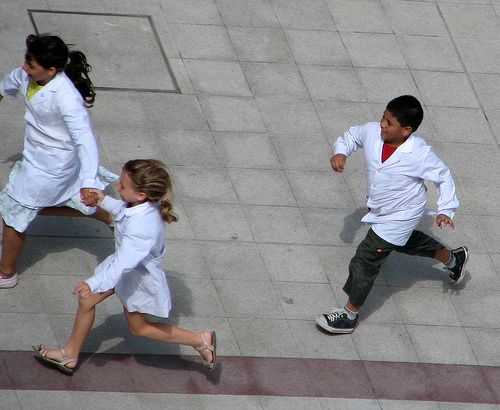 I find two trends in education alarming: the growing number of schools that eliminate recess and physical education programs and the large number of children on Ritalin for attention problems. As a teacher, I can’t help but wonder if the attention problems some children experience is due to the structure and expectations of education and life in the 21st century. Children were not designed to just sit at desks all day long without much opportunity for movement and interaction.
I find two trends in education alarming: the growing number of schools that eliminate recess and physical education programs and the large number of children on Ritalin for attention problems. As a teacher, I can’t help but wonder if the attention problems some children experience is due to the structure and expectations of education and life in the 21st century. Children were not designed to just sit at desks all day long without much opportunity for movement and interaction.
A friend of mine, who also happens to be our school nurse, has a son with ADD. This child takes rRitalin during the school year; however, during summer vacation, he is drug free. It is only during the structured, restricted environment of school that this child needs drugs to focus. Given recent research on the subject, I can’t help but believe recess and play matters greatly for all children, especially those suspected of having attention problems.
Olga Jarrett, associate professor of Early Childhood Education at Georgia State University, explains her research in which children’s behavior was monitored:
On the days the students had recess before class, the children were more focused and less fidgety. Following a recess break, the children were more likely to be doing what they were supposed to be doing—whether it was reading or writing, looking at the teacher, or listening to another child recite…Brain research shows that breaking tasks up into pieces and providing a change of pace in between enables the brain to focus better.
Tyler, the fifth grader with ADD, shares his personal experience, “It’s easier for me to focus after recess because I’m not as antsy anymore. I’ve had my fun and now it’s time to do my work. I think recess helps us a lot.”
Research with rats supports these conclusions. Jaak Panksepp, Ph.D., a neuroscientist at Washington State University, found that rats that were allowed to play freely did not become rambunctious or violent. These rats played normally and grew up to be well-adjusted with no signs of hyperactivity. Rats with limited opportunities to play displayed a lack of social skills and hyperactivity.
Could the structured lives children live today both in and outside of school be responsible for their hyperactivity? Many kids are overscheduled and not given time to simply play. Once again, I am reminded that for normal development, children need to play. In fact, Panksepp’s research has led him to believe that the hyperactivity seen in some children is just their way of expressing their need for more play.
Image: lrargerich on Flickr under a Creative Commons License
Kids need fresh air and sunshine, not some sketchy meds.
Down with Ritalin, up with nature!
I WHOLEHEARTEDLY agree!! Which is why I’m going to homeschool.
As my dog trainer says “The only good dog is a tired dog.” We’re so smart about dogs, why not understand our children’s need for exercise and play?
I believe for some children, there might be a need for the medicine. As a parent and a teacher, I advocate for everything other then medicine FIRST. What alternatives are there? A second opinion? Homeschooling or switching to a school with less structure. Your friend is probably trying her best but she has to see the connection. Children shouldn’t be medicated to learn. Learning is activity and engagement. Doing, seeing, feeling, and experiencing. Not all of that is going to happen behind a desk.
great post!
I’m a firm believer in keeping recess for kids. Good thing my daughter’s school is too. Kids need to play.
As for Ritalin and the like, I’d try a lot of alternatives first, including homeschooling.
Thanks for this great post. I agree many kids benefit a lot more from recess than they do from Ritalin. I would only turn to drugs for kids as a last result.
I have two boys with ADHD one more severe than the other and both are on Adderal. If it was as easy as just going out to play then yes I would agree. I’ve tried diet, exercise and even therapy before turning to medication. My oldest child hated school he couldn’t sit still, he couldn’t concentrate and he was always getting into trouble because of it. His self esteem was shot, he didn’t feel normal and his mind was racing. Medication helped him greatly and he loves school now.
DTParenting, Thanks for sharing your personal experience. Each child is different, and as a parent, you are an expert on your children. I do not have a child with ADHD, but I wanted to present the information from this study. I am glad your child is feeling more self-confident and successful in school!
So true. I’m hoping public school administrators get this soon. Their anecdote for declining test scores is to take away recess and the arts, along with replacing after school play with more tutoring (regurgitation). So counter-productive and sad for the kids who just need some time to be kids.
So true. I’m hoping public school administrators (in Texas) get this soon. Their anecdote for declining test scores is to take away recess and the arts, and replace after school play with more tutoring (i.e. regurgitation). So counter-productive and sad for the kids who just need some time to be kids.
Hi, if anyone needs Ritalin
just send a mail to
brunnerm_82@gmx.at
best regards
Markus
——————————————————————-
Quick, discrete & trustworthy – your professional Ritalin partner.